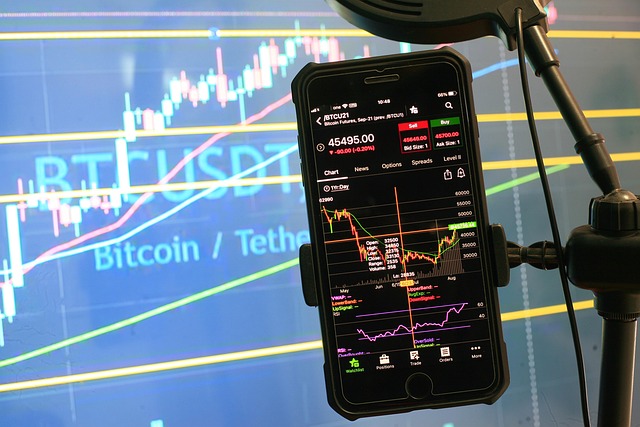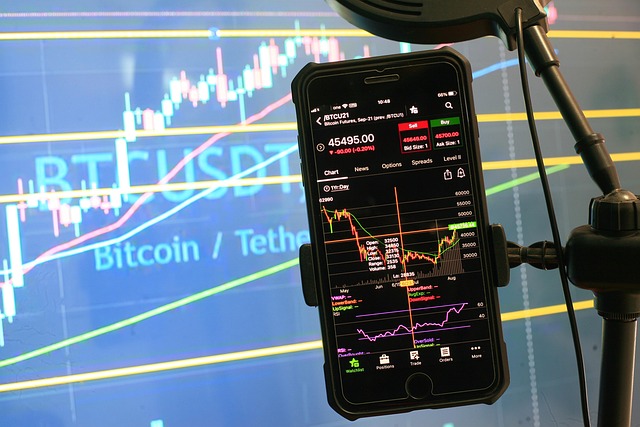Is Crypto Spot Trading Halal in 2025? A Comprehensive Islamic Perspective
Author: Jameson Richman Expert
Published On: 2025-08-11
Prepared by Jameson Richman and our team of experts with over a decade of experience in cryptocurrency and digital asset analysis. Learn more about us.
Crypto spot trading has surged in popularity over recent years, becoming a significant component of global financial markets. Fueled by innovations in blockchain technology, decentralized finance (DeFi), and the proliferation of digital assets, the cryptocurrency ecosystem continually evolves, presenting new opportunities and challenges for traders. For Muslim investors and traders, a pressing question remains: is engaging in crypto spot trading permissible (halal) under Shariah law in 2025? Given the rapid technological advancements, shifting regulations, and diverse market practices, a nuanced and thorough analysis is essential. This article delves deeply into the Islamic perspective on crypto spot trading in 2025, integrating scholarly insights, core Shariah principles, and practical guidelines to assist Muslim participants in making compliant and ethical decisions.

Understanding Crypto Spot Trading: Mechanics, Features, and Market Dynamics
Crypto spot trading involves the immediate exchange of cryptocurrencies at the prevailing market price, with ownership transferring directly from seller to buyer almost instantaneously. Unlike derivatives trading—such as futures, options, or margin trading—which often involve leverage, speculation, and credit arrangements, spot trading emphasizes real ownership and straightforward transactions.
Core features of crypto spot trading include:
- Immediate Ownership Transfer: Upon transaction execution, legal ownership of the digital asset shifts from the seller to the buyer, reflecting clarity and transparency.
- No Use of Leverage or Borrowed Funds: Standard spot trades typically do not involve borrowing or interest-based financing, thereby sidestepping riba concerns.
- Market-Driven Pricing: Prices are determined by genuine supply and demand forces, reducing the risk of artificial manipulation or excessive speculation.
- Physical Delivery of Cryptocurrencies: The outcome is the transfer of actual assets, distinguishing spot trading from derivatives that derive value without transfer of ownership.
Understanding these mechanics is crucial for assessing whether such transactions align with Islamic principles, particularly in terms of fairness, transparency, and the avoidance of prohibited elements like riba (interest) and gharar (excessive uncertainty).
Fundamental Principles of Islamic Finance
Islamic finance is predicated on divine guidance from the Quran and Sunnah, emphasizing ethical conduct, justice, and transparency. The core prohibitions shaping Islamic financial transactions include:
- Riba (Interest): Any guaranteed increase or usury—whether through loans, investments, or speculative arrangements—is strictly forbidden. Riba leads to unjust enrichment and societal imbalance, and its prohibition is explicitly emphasized in multiple Quranic verses.
- Gharar (Excessive Uncertainty): Transactions characterized by ambiguity, significant risk, or lack of clarity are prohibited because they undermine trust, fairness, and mutual consent in commercial dealings.
- Maysir (Gambling/Speculation): Activities driven solely by chance, speculation, or excessive uncertainty are considered haram, as they promote recklessness and unjust profits at the expense of others.
Applying these principles to cryptocurrency trading requires rigorous scrutiny. For instance, ensuring transactions are transparent, free from interest, and involve legitimate assets are essential criteria for compliance. Moreover, the avoidance of excessive speculation and ensuring the assets have tangible or intrinsic value align trading practices with Islamic ethics.
Scholarly Perspectives on Cryptocurrency and Shariah Compliance in 2025
The scholarly community’s views on cryptocurrencies remain diverse, reflecting different interpretations of their nature, utility, and associated market practices. The debate centers around whether cryptocurrencies serve as legitimate mediums of exchange, stores of value, or commodities, and whether their features comply with Islamic ethical standards.
Cryptocurrencies as Commodities or Digital Currencies
Many contemporary Islamic scholars categorize cryptocurrencies—such as Bitcoin—as digital commodities akin to precious metals like gold and silver. They highlight attributes such as scarcity, decentralization, and the potential for intrinsic utility, viewing these features as supportive of permissible trading if ownership is transparent and transactions adhere to ethical standards. This analogy lends support to the view that trading cryptocurrencies can be halal, provided that trading practices are just, transparent, and free from deception.
Alternatively, some scholars consider cryptocurrencies as digital currencies or mediums of exchange. If their use in transactions aligns with Islamic ethics—meaning they are used for legitimate purposes, with clear contractual terms—their trading may be considered permissible. The key is whether the asset functions as a reliable and ethical medium of exchange or store of value.
Arguments Supporting and Opposing Halal Status
- Supportive Arguments: Cryptocurrencies' decentralization, absence of interest-based elements, and potential backing by tangible assets such as gold-backed tokens or stablecoins support their permissibility. When used responsibly and transparently, they can be viewed as legitimate assets for trade.
- Reservations and Concerns: High volatility, speculative nature, lack of intrinsic utility, and potential misuse for illicit purposes—such as money laundering or fraud—raise significant concerns. Excessive speculation resembles gambling (maysir), and if trading involves significant gharar, it can be deemed non-halal from an Islamic perspective.

Classifying Cryptocurrencies: Commodity, Currency, or Asset?
The classification of cryptocurrencies significantly influences their permissibility under Islamic law. When regarded as commodities—especially if backed by tangible assets or inherently utility-driven—they are more aligned with Islamic ethics. Proper ownership transfer, transparency, and the absence of deception are essential in this context.
Conversely, tokens with no intrinsic utility or backing, driven primarily by speculative motives, are viewed skeptically. Their high volatility and reliance on market sentiment can resemble gambling, potentially invalidating their trading from an Islamic standpoint.
Key Conditions for Halal Crypto Spot Trading in 2025
To align crypto spot trading with Islamic principles, traders should ensure the following conditions are met:
- Genuine Ownership and Clear Transfer: The trader must hold legal, verifiable ownership of the cryptocurrency before initiating a sale, ensuring the transfer process is straightforward, transparent, and free from manipulative practices.
- Certainty (Yaqin) and Clarity: All contractual terms—assets involved, price, and conditions—must be explicitly stated and unambiguous. Excessive gharar undermines contract validity and contravenes Islamic ethics.
- No Riba or Riba-Like Elements: The trade must not involve interest, usury, or interest-based financing. This includes avoiding leverage or borrowing arrangements that generate interest.
- Use of Shariah-Compliant Platforms: Transactions should be conducted on exchanges or platforms certified or recognized for adhering to Islamic finance principles, with transparent practices and ethical standards.
- Legal and Shariah Alignment: Traders should verify their activities' compliance with local fatwas, Islamic legal opinions, and relevant regulations to ensure legitimacy.
Practical Guidelines for Muslim Traders in 2025
Given the evolving landscape, Muslim traders should adopt a cautious and informed approach. Practical steps include:
- Consult Qualified Islamic Scholars: Seek advice from knowledgeable scholars specializing in Islamic finance and modern financial instruments to obtain tailored fatwas and guidance.
- Prioritize Shariah-Compliant Platforms: Use reputed exchanges that explicitly endorse Islamic compliance—look for certifications, endorsements, or community trustworthiness.
- Conduct Due Diligence: Investigate the legitimacy, technological foundation, and reputation of cryptocurrencies before trading. Use reputable research tools, community feedback, and analysis to assess risks and compliance.
- Practice Responsible Risk Management: Avoid reckless trading driven by greed or speculation. Manage exposure prudently, adhering to ethical standards and avoiding unjust gains or losses.
- Stay Updated: Continuously monitor updates from Islamic scholars, fatwas, and regulatory changes, as well as technological developments impacting the permissibility and conduct of crypto activities.

Risks, Ethical Challenges, and Considerations in Crypto Trading
Despite the potential for compliance, crypto spot trading involves inherent risks that necessitate cautious engagement:
- Market Volatility: Cryptocurrencies are highly volatile, with rapid price swings that can lead to significant financial loss, especially for inexperienced traders.
- Security and Privacy Risks: Digital assets are susceptible to hacking, scams, and loss of private keys, which can result in irreversible loss of wealth.
- Regulatory Uncertainty: Divergent legal frameworks or potential future bans in certain jurisdictions can impact the legitimacy and safety of crypto trading activities.
- Speculation and Gharar: Excessive speculation resembles gambling, which is forbidden. Traders must avoid engaging in activities that involve high uncertainty or purely speculative motives.
Islamically, maintaining transparency, avoiding greed-driven behaviors, and ensuring activities are conducted within ethical boundaries are vital to uphold Islamic standards and protect traders from harmful practices.
Conclusion: Navigating Crypto Spot Trading in 2025 with Islamic Principles
Ultimately, the permissibility of crypto spot trading in 2025 hinges on strict adherence to Islamic core principles—particularly the avoidance of riba, gharar, and maysir—and the nature of the cryptocurrencies involved. When trading involves genuine ownership, transparency, and compliance with ethical standards, it can potentially be classified as halal.
However, the high volatility, speculative tendencies, and evolving regulatory landscape necessitate cautious engagement. Muslim traders should consult qualified Islamic scholars, choose Shariah-compliant platforms, and stay informed about scholarly consensus and legal frameworks. As Islamic finance continues to adapt to technological innovations, ongoing scholarly dialogue and research will be crucial in clarifying permissible practices and expanding ethical opportunities in the crypto domain.
Engaging responsibly and ethically in crypto trading offers avenues for wealth development aligned with Islamic values. Platforms like Binance, MEXC, and Bitget are increasingly providing Shariah-compliant options, enabling Muslims to participate confidently when adhering to sound principles. A cautious, well-informed approach ensures that financial pursuits remain harmonious with spiritual principles, fostering an ethical and balanced engagement with cryptocurrencies in 2025 and beyond.
For further insights into trading strategies, technical analysis, and market signals, consider exploring reputable sources such as best free crypto trading apps. Staying updated and acting responsibly ensures your participation remains both profitable and compliant with Islamic law.